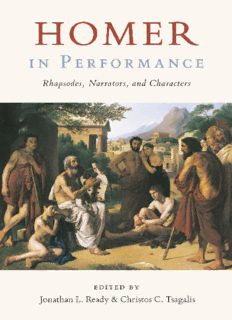
Homer in Performance: Rhapsodes, Narrators, and Characters PDF
Preview Homer in Performance: Rhapsodes, Narrators, and Characters
Homer in Performance RReeaaddyy__66667799--ffiinnaall..iinnddbb ii 44//2233//1188 44::1188 PPMM Ashley and Peter Larkin Series in Greek and Roman Culture RReeaaddyy__66667799--ffiinnaall..iinnddbb iiii 44//2233//1188 44::1188 PPMM Homer in Performance Rhapsodes, Narrators, and Characters Edited by Jonathan L. Ready and Christos C. Tsagalis University of Texas Press Austin RReeaaddyy__66667799--ffiinnaall..iinnddbb iiiiii 44//2233//1188 44::1188 PPMM Copyright © 2018 by the University of Texas Press All rights reserved Printed in the United States of America First edition, 2018 Requests for permission to reproduce material from this work should be sent to: Permissions University of Texas Press P.O. Box 7819 Austin, TX 78713-7819 utpress.utexas.edu/rp-form The paper used in this book meets the minimum requirements of ANSI/NISO Z39.48-1992 (R1997) (Permanence of Paper). Library of Congress Cataloging-in-Publication Data Names: Ready, Jonathan L., 1976–, editor. | Tsagalis, Christos, editor. Title: Homer in performance : rhapsodes, narrators, and characters / edited by Jonathan L. Ready and Christos C. Tsagalis. Description: First edition. | Austin : University of Texas Press, 2018. | Includes bibliographical references and index. Identifi ers: LCCN 2017051212 ISBN 978-1-4773-1603-0 (cloth : alk. paper) ISBN 978-1-4773-1604-7 (library e-book) ISBN 978-1-4773-1605-4 (nonlibrary e-book) Subjects: LCSH: Homer—Criticism, Textual. | Epic poetry, Greek— History and criticism—Theory, etc. | Performing arts— Appreciation—Greece. | Oral interpretation of poetry. | Oral tradition—Greece. Classifi cation: LCC PA4037 .H77474 2018 | DDC 883/.01—dc23 LC record available at https://lccn.loc.gov/2017051212 doi:10.7560/316030 RReeaaddyy__66667799--ffiinnaall..iinnddbb iivv 44//2233//1188 44::1188 PPMM Contents A Note on Iota Adscript and the Transliteration of Proper Nouns vii Acknowledgments ix Introduction 1 Jonathan L. Ready and Christos C. Tsagalis Part I. Rhapsodes 27 Chapter One. Performance Contexts for Rhapsodic Recitals in the Archaic and Classical Periods 29 Christos C. Tsagalis Chapter Two. Reading Rhapsodes on Athenian Vases 76 Sheramy D. Bundrick Chapter Three. Performance Contexts for Rhapsodic Recitals in the Hellenistic Period 98 Christos C. Tsagalis Chapter Four. Rhapsodes and Rhapsodic Contests in the Imperial Period 130 Anne Gangloff Chapter Five. Formed on the Festival Stage: Plot and Characterization in the Iliad as a Competitive Collaborative Process 151 Mary R. Bachvarova RReeaaddyy__66667799--ffiinnaall..iinnddbb vv 44//2233//1188 44::1188 PPMM | vi Contents Chapter Six. Did Sappho and Homer Ever Meet? Comparative Perspectives on Homeric Singers 178 Olga Levaniouk Part II. Narrators and Characters 203 Chapter Seven. Odysseus Polyonymous 205 Deborah Beck Chapter Eight. Embedded Focalization and Free Indirect Speech in Homer as Viewpoint Blending 230 Anna Bonifazi Chapter Nine. Speech Training and the Mastery of Context: Thoas the Aetolian and the Practice of Muthoi 255 Joel P. Christensen Chapter Ten. Diomedes as Audience and Speaker in the Iliad 278 James O’Maley Chapter Eleven. Hektor, the Marginal Hero: Performance Theory and the Homeric Monologue 299 Lorenzo F. Garcia Jr. Chapter Twelve. Performance, Oral Texts, and Entextualization in Homeric Epic 320 Jonathan L. Ready Chapter Thirteen. Homer’s Rivals? Internal Narrators in the Iliad 351 Adrian Kelly Works Cited 378 Notes on Contributors 419 Index of Terms 421 Index of Passages 425 RReeaaddyy__66667799--ffiinnaall..iinnddbb vvii 44//2233//1188 44::1188 PPMM A Note on Iota Adscript and the Transliteration of Proper Nouns W e use an iota adscript, not subscript, when quoting Greek. We follow Richmond Lattimore’s spellings of the names of Homeric characters (kappa is k; chi is ch), but opt for Athena, not Athene. We Latinize the names of (familiar) ancient authors (Herodotus) and an- cient scholars (Aristarchus, Zenodotus). We transliterate the names of historical fi gures (Megakles, Nikeratos, Perikles) and the names of ac- tual places (Skepsis), although we retain the familiar spellings of certain places (Cyprus, Syracuse). All of this is aspirational, and inconsistencies likely remain. vii RReeaaddyy__66667799--ffiinnaall..iinnddbb vviiii 44//2233//1188 44::1188 PPMM THIS PAGE INTENTIONALLY LEFT BLANK Acknowledgments W e thank Jim Burr, Nancy Bryan, Lynne Chap- man, and the other members of the team at the Univer- sity of Texas Press for their guidance in bringing this project to fruition. The two anonymous readers for the press provided excellent feedback on the initial submission. Kerri Cox Sullivan skillfully copy edited. We off er a special thanks to Noah Kaye for making the maps. ix RReeaaddyy__66667799--ffiinnaall..iinnddbb iixx 44//2233//1188 44::1188 PPMM
Description: